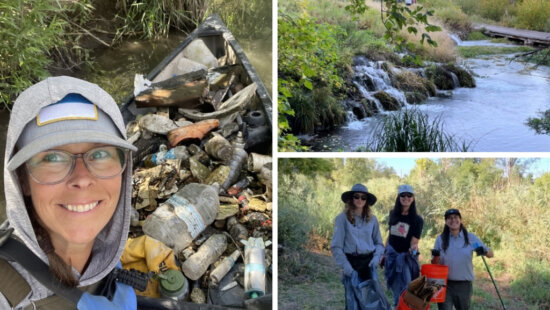Education
Utah has long ranked as the worst state for women. Here’s the latest research

Students work in a class at Wasatch Junior High School in Salt Lake City on Tuesday, March 12, 2024. Photo: Spenser Heaps // Utah News Dispatch
Survey shows most Utahns agree girls need more educational encouragement and opportunities, but perceptions are disconnected from reality as women continue to lag
By: Katie McKellar, Utah News Dispatch
For nine years and counting, Utah has ranked as the worst state in the nation for women’s equality.
That’s according to a WalletHub’s annual report that weighs 17 key indicators. They include:
- Workplace environment challenges like wage gaps and employment disparities.
- Gaps in education, including college graduation rates and disparities in math scores.
- Rates of women in elected positions.
For its ranking, WalletHub uses data from the U.S. Census Bureau, Bureau of Labor Statistics, U.S. Equal Employment Opportunity Commission, National Women’s Law Center, Institute for Women’s Policy Research, The Nation’s Report Card, Centers for Disease Control & Prevention, and Center for American Women and Politics.
On Tuesday, Utah State University’s Utah Women & Leadership Project — which has a mission to research and help improve disparities for the state’s women and girls — released a slate of new research from an 80-question survey conducted from Oct. 24 to Nov. 30. The results unpack the latest attitudes and public perceptions that Utah women and girls face today as they continue to grapple with these challenges.
The survey of about 3,500 of adults over 18 provides a window into Utahns’ current perceptions around where women and girls stand when it comes to K-12 education (including perceptions around math skills, technical education and career advancement), higher education attainment (college graduation rates) and workplace culture (family-friendly policies, opportunities for career advancement and providing a sense of belonging for women).
Susan Madsen, founding director of the Utah Women & Leadership Project and a professor of leadership at the Jon M. Huntsman School of business at Utah State University, said the survey found most Utahns generally agree more women and girls need to be encouraged and empowered to pursue careers in math and technical careers, for example. And yet, she said there’s a “big disconnect” between those perceptions and reality, since data shows Utah women and girls continue to lag in these areas.
“At least we know we don’t have to convince people that it is important, but we need to now work on the next level to get them to see, well, how do we behave differently (to help girls succeed),” Madsen said.
If perception isn’t the problem, Madsen said Utah leaders and policymakers need to “dig deeper into the behaviors that have to change” to break down the barriers for women and girls.
“There’s something in the socialization, with raising girls here (in Utah)” that contributes to their challenges, Madsen said. “We need to figure that one out.”
Why is it that Utah continues to lag compared to other states when it comes to women and girls? Madsen said research has shown conservative, religious states tend to generally foster a culture that encourages more traditional roles for men and women.
“You tend to have women more in a private role and men in a public role,” she said, and that can fuel a “power dynamic” that influences all aspects of life for women, from social expectations to career and leadership opportunities.
With this research, the Utah Women & Leadership Project hopes to provide a “baseline” that can be used by another Utah State University project called A Bolder Way Forward. That project’s primary aim is to help more Utah women and girls thrive.
The summaries released Tuesday are three of a total of 19 the Utah Women & Leadership Project plans to publish over the next few months to provide insights into Utahns’ current perceptions around women and girls. So far, 13 summaries have been released this year.
K-12 schools
Utah ranks 50th in the nation for having the largest disparity between boys and girls in eighth grade math test scores, according to the Nation’s Report Card.
The Utah Women & Leadership Project’s survey found:
- Most Utahns agree that it’s important for girls in K-12 schools to have strong math skills for their future career and life, with about 40% strongly agreeing.
- About 82% agree at some level that young women need to complete career and technical education pathways in high school.
- Nearly 2,300 Utahns “strongly agree” that it is as important for girls as it is for boys to take advanced coursework in high school that prepares them for postsecondary opportunities and careers.
- Over 55% agreed or strongly agreed that it’s concerning that The National Report Card’s math scores for eighth graders in Utah are lower for girls than they are for boys.
“Our results illustrate there are subtle and not-so-subtle messages influencing Utah girls to believe they are not good at math,” Madsen said. “The divide, however, has been created by socialization rather than genetics.”
Higher education
Most Utahns agree high education is valuable and agree it’s important for women to complete graduate degrees. Most also agreed that inclusive environments are critical for students to create a sense of belonging, the survey found. Results included:
- More than 90% strongly or somewhat agree that higher education is important for intellectual growth, personal development, and lifelong societal contributions.
- Most agreed that inclusive environments are critical to cultivating a culture of belonging in higher education. Only 10.7% disagreed at any level.
- Nearly 63% agreed or strongly agreed that it is important that more Utah women complete graduate degrees.
- Over 75% agreed at some level that women students of color face more barriers than other students when pursuing careers in high-wage, high-demand fields.
“The pursuit and completion of post-secondary certificates and degrees remains a critical component for the economic stability of families, communities, and the state,” Madsen said. “Expanding access and opportunity to higher education for all Utahns is important moving forward.”
Workplace culture
Madsen said the survey’s results when it came to workplace culture indicated there’s “still work to do” when it comes to encouraging companies to foster family-friendly policies and a culture that’s welcoming for women, regardless of if they have children or not.
The survey’s findings include:
- Nearly half of Utahns (46.7%) are either unsure or disagree that their organization offers family-friendly policies that meet their needs.
- Over 43% are unsure or disagree that they have opportunities for advancement within their organization. Women were less likely to report opportunities for advancement.
- Only 17% strongly agree that their organizations have “strategies that advance women in the workplace.” Nearly 1 in 3 are neutral (32.1%), and 21.2% disagree on some level.
- Utahns are split when it comes to feeling a sense of belonging at work. Demographic groups with stronger feelings of belonging include those with college education, higher income, individuals who are married, are parents, work full time, and those who are Pacific Islander or white. Those who identify as Black or Native American/American Indian are the least likely to experience feelings of belonging.
“Utah is most likely making progress since the pandemic forced workplaces to become more flexible. But there is still work to do,” Madsen said, adding partners like the Governor’s Office of Economic Opportunity and the Women’s Leadership Institute “are leading the change in Utah.”
Madsen said many Utah companies have implemented more flexible and family-friendly policies and practices. However, tens of thousands across Utah haven’t yet done so.
“To continue Utah’s economic success,” she said “it is critical that more employers support employees in more powerful ways.”



















